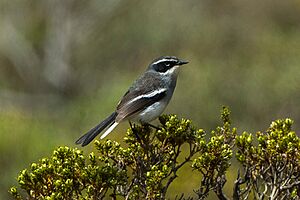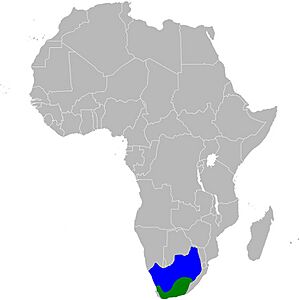Fairy flycatcher facts for kids
Quick facts for kids Fairy flycatcher |
|
|---|---|
 |
|
| Conservation status | |
| Scientific classification |
|
| Kingdom: | Animalia |
| Phylum: | Chordata |
| Class: | Aves |
| Order: | Passeriformes |
| Family: | Stenostiridae |
| Genus: | Stenostira Cabanis & Bonaparte, 1850 |
| Species: |
S. scita
|
| Binomial name | |
| Stenostira scita (Vieillot, 1818)
|
|
 |
|
| Range map Resident year-round range Non-breeding winter visitor range | |
| Script error: The function "autoWithCaption" does not exist. | |
| Synonyms | |
|
Muscicapa scita Vieillot, 1818 |
|
Script error: No such module "Check for conflicting parameters".
The fairy flycatcher (Stenostira scita) is a small passerine bird. It is also sometimes called the fairy warbler. This bird belongs to a special bird family called Stenostiridae.
You can find the fairy flycatcher living in southern Africa. It makes its home in countries like Botswana, South Africa, Lesotho, and Namibia. Sometimes, it visits Zimbabwe and Eswatini.
These birds often move with the seasons. They breed in areas with karoo scrub and fynbos plants. When winter comes, they fly north to warmer places with thorn bushes. This journey is a type of bird migration.
Contents
What Does the Fairy Flycatcher Look Like?
The fairy flycatcher is a small bird, about 11 to 12 centimeters long. That's about the length of your hand!
It has a pale grey back and a black "mask" across its eyes. A white stripe, called a supercilium, runs above its eye. Its wings are black with a long white stripe. The tail is also black but has white on its sides.
The bird's throat is white, and its chest is pale grey. Its belly is white, with a hint of pinkish-grey in the middle. Both male and female fairy flycatchers look very similar. Young birds are a bit browner than the adults. Their eyes are brown, and their beaks and legs are black.
Fairy Flycatcher Behavior
Fairy flycatchers usually stay with one partner for life. If their mate dies, they will find a new one.
Reproduction and Nesting
These birds build an open, cup-shaped nest. They use thin stems and other plant bits. The inside of the nest is soft, lined with plant down. They hide their nests well in the branches of trees or bushes.
The female fairy flycatcher lays two or three green eggs.
Diet and Foraging
Fairy flycatchers are usually seen alone or in pairs. Sometimes, they gather in small groups. They love to eat small insects and other tiny invertebrates. They search for their food among the leaves of plants, much like a warbler bird does.
 | Bessie Coleman |
 | Spann Watson |
 | Jill E. Brown |
 | Sherman W. White |


